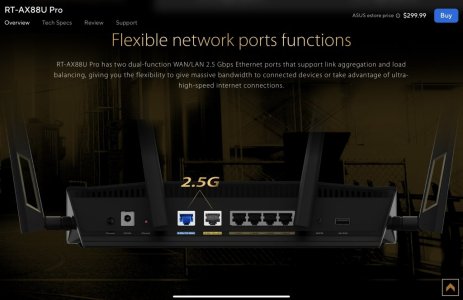I currently have the RT-AX86 plus a Netgear Prosafe (8 port gigabit switch) and a prosafe 5 port gigabit switch (not in use) I also have a TP-Link AX4400 router that I had purchased before the Asus that is still receiving firmware updates. Latest one was from last month. The main reason I purchased the Assus was out of curiosity about the advanced features. After some trial and error, I think any router with a guest network that's on a different subnet from the main network and will isolate the guests from the main network, will work just as well. I'll continue to use my RT-AX86 as long as possible since it's working. But I think I could have saved myself quite a bit of time and money wasted, if I had known a cheaper router would have done everything I needed, even some of the more advanced things. The other point I'll give to TP-Link is, I don't think their firmware updates are such a gamble compared to Asus regarding whether, or not it's going to break something or not. The 2nd Point I would give TP-Link is regarding services such as UPNP. I use GRC's Shields up as a baseline of testing and Asus has the UPNP hole they look for, while TP-Link does not. This means I could keep UPNP on, on the TP-Link and still have the router report as stealth, and with the Asus, if it's on, it's flagged as vulnerable. I'm simply listing my observations from using both brands of router.
With that said though, I typically just turn off UPNP, I would just feel more secure leaving it on, with a TP-Link router, over an Assus based on the shields up results.




